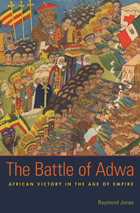
In March 1896 a well-disciplined and massive Ethiopian army did the unthinkable-it routed an invading Italian force and brought Italy's war of conquest in Africa to an end. In an age of relentless European expansion, Ethiopia had successfully defended its independence and cast doubt upon an unshakable certainty of the age-that sooner or later all Africans would fall under the rule of Europeans. This event opened a breach that would lead, in the aftermath of world war fifty years later, to the continent's painful struggle for freedom from colonial rule.
Raymond Jonas offers the first comprehensive account of this singular episode in modern world history. The narrative is peopled by the ambitious and vain, the creative and the coarse, across Africa, Europe, and the Americas-personalities like Menelik, a biblically inspired provincial monarch who consolidated Ethiopia's throne; Taytu, his quick-witted and aggressive wife; and the Swiss engineer Alfred Ilg, the emperor's close advisor. The Ethiopians' brilliant gamesmanship and savvy public relations campaign helped roll back the Europeanization of Africa.
Figures throughout the African diaspora immediately grasped the significance of Adwa, Menelik, and an independent Ethiopia. Writing deftly from a transnational perspective, Jonas puts Adwa in the context of manifest destiny and Jim Crow, signaling a challenge to the very concept of white dominance. By reopening seemingly settled questions of race and empire, the Battle of Adwa was thus a harbinger of the global, unsettled century about to unfold.

The story of how nineteenth-century European rulers conspired with Mexican conservatives in an outlandish plan to contain the rising US colossus by establishing Old World empire on its doorstep.
The outbreak of the US Civil War provided an unexpected opportunity for political conservatives across continents. On one side were European monarchs. Mere decades after its founding, the United States had become a threat to European hegemony; instability in the United States could be exploited to lay a rival low. Meanwhile, Mexican antidemocrats needed a powerful backer to fend off the republicanism of Benito Juárez. When these two groups found each other, the Second Mexican Empire was born.
Raymond Jonas argues that the Second Mexican Empire, often dismissed as a historical sideshow, is critical to appreciating the globally destabilizing effect of growing US power in the nineteenth century. In 1862, at the behest of Mexican reactionaries and with the initial support of Spain and Britain, Napoleon III of France sent troops into Mexico and installed Austrian archduke Ferdinand Maximilian as an imperial ruler who could resist democracy in North America. But what was supposed to be an easy victory proved a disaster. The French army was routed at the Battle of Puebla, and for the next four years, republican guerrillas bled the would-be empire. When the US Civil War ended, African American troops were dispatched to Mexico to hasten the French withdrawal.
Based on research in five languages and in archives across the globe, Habsburgs on the Rio Grande fundamentally revises narratives of global history. Far more than a footnote, the Second Mexican Empire was at the center of world-historic great-power struggles—a point of inflection in a contest for supremacy that set the terms of twentieth-century rivalry.
READERS
Browse our collection.
PUBLISHERS
See BiblioVault's publisher services.
STUDENT SERVICES
Files for college accessibility offices.
UChicago Accessibility Resources
home | accessibility | search | about | contact us
BiblioVault ® 2001 - 2024
The University of Chicago Press









